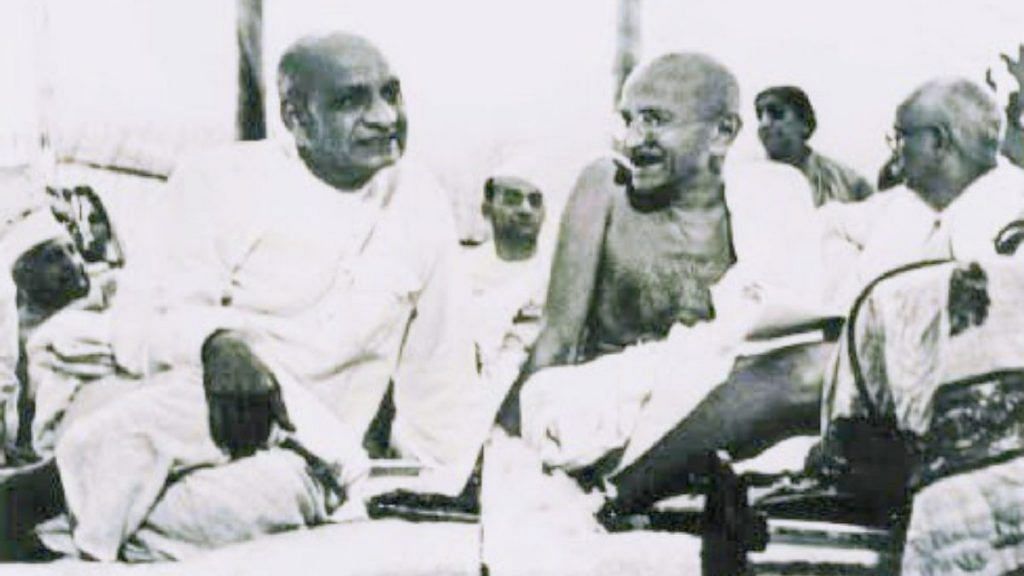Outbreak of a dangerous disease like Covid-19 brings challenges as well as opportunities for political leadership.
It also distinguishes between two styles of leadership — one that believes in observing from a distance and the other, which believes in being physically present with the masses. The leadership style of leaders like Mohandas Karamchand Gandhi and Sardar Vallabhbhai Patel when they wrestled with spread of the plague, however, was starkly different from the current crop of leaders who are battling coronavirus pandemic.
World leaders from Donald Trump to Justin Trudeau are monitoring the situation from a ‘safe distance’. Indian leaders, be it Prime Minister Narendra Modi or Congress leader Rahul Gandhi, are doing video conferencing to talk about the Covid-19 crisis which has claimed the lives of 939 Indians as of 28 April.
Also Read: When Delhi rioted, Sardar Patel busted fake news and wanted a Hindu newspaper banned
Gandhi — the caregiver
In 1904, when Gandhi was barely a community leader at Johannesburg, South Africa, he didn’t hesitate risking his life fighting against the spread of pneumonic plague among local Indians. He also inspired his four clerks (‘call them clerks, co-workers or sons’) for taking care of the patients. The risk was evident even then — a trained nurse got infected and lost her life.
While leading from the front, Gandhi co-operated with the local municipality. Yet, he didn’t spare municipality for its failure. He wrote a strong letter to the press ‘holding the municipality guilty of negligence…and responsible for the outbreak of plague itself’
(An Autobiography or The Story of My Experiments with Truth, M.K. Gandhi, Navjivan Press, Ahmedabad, Second Edition, May 1940, p. 358).
All the 23 patients and those who were nursing them, including Gandhi, were advised to take doses of brandy. But Gandhi didn’t believe in medical benefits of brandy and wanted to try out ‘earth’ treatment. Yet, instead of forcing his beliefs on the patients, he took the permission of the doctor in charge and consent of the patients. Three patients agreed and Gandhi ‘started applying wet earth bandages to their heads and chests.’ Of them, two survived.
(An Autobiography or The Story of My Experiments with Truth, M.K. Gandhi, Navjivan Press, Ahmedabad, Second Edition, May 1940, p. 357).
Satyagraha was yet to be born. But for Gandhi, ‘the black plague enhanced my influence with the poor Indians and increased my business and my responsibility.’ He risked his life not for ambition, but out of a call for duty.
(An Autobiography or The Story of My Experiments with Truth, M.K. Gandhi, Navjivan Press, Ahmedabad, Second Edition, May 1940, p.363).
He was a leader who didn’t ‘keep tab on the situation’ from safe distance or confine himself to delivering sermons from ivory tower, even when he enjoyed the status of a ‘Mahatma’ among masses. Selfless service was evident throughout his life, be it in treating a patient of leprosy —Parchure Shastri — or staying at plague-infected taluka of Borsad, Gujarat in 1935.
Also Read: Shaheen Bagh couldn’t get CAA revoked. But Gandhi’s satyagraha didn’t meet its goal either
Patel fought the plague
Sardar Vallabhbhai Patel was cast in the same mould of leadership. He always remained a servant of the people even after achieving fame as the ‘Sardar’. Seven years after Bardoli Satyagrah that catapulted him into national prominence, he was informed about the cases of plague in Borsad taluka of Gujarat. The disease started in 1932 and was spreading year after year. There were approximately 450 cases in 27 villages of Borsad taluka. Sardar Patel first sought advice from a doctor, Bhaskar Patel, and got a clear picture of the situation, difficulties therein, things that were required to be done scientifically and the available resources.
Then he camped at Borsad, the taluka place that used to be his home ground during his practice as a lawyer. A coat in a pandal under a tree became his office. He conducted and co-ordinated all efforts —recruiting volunteers, informing them about the risk involved, arranging hospital beds, conducting cleanliness drive in the affected villages, preparing pamphlets for the villagers etc.
At the time when not even the family members were ready to treat the plague patients, local leaders and volunteers followed the inspiring guidance of Sardar Patel, and won the battle against the plague.
Sardar visited all the affected villages personally. The volunteers learnt lessons of courage from Sardar and his associate Darbar Gopaldas —‘The Prince of Gujarat’.
(JeevanNaan Zaranaan, Ravjibhai Patel, Navjivan Prakashan Mandir, Ahmedabad, p.434).
Gandhi and Mahadev Desai also joined them at Borsad and stayed in a pandal under a mango tree, near Sardar’s pandal. They also visited all affected villages, met people door to door, checked their houses, gave suggestions for sanitation and helped Sardar in his effort.
(JeevanNaan Zaranaan, Ravjibhai Patel, Navjivan Prakashan Mandir, Ahmedabad, p.441-442)
But in the present scenario, even the health minister of the country, who is a doctor himself, is not on the ground. Instead, efforts are being made to consolidate the personality cult even more, and to create divide and settle political scores. Surveys that prove the popularity of the Prime Minister are released enthusiastically at such a difficult time.
Winning the trust of people shouldn’t mean delivering television monologues, without any accountability.
The author is a senior columnist and writer based in Ahmedabad. Views are personal.
